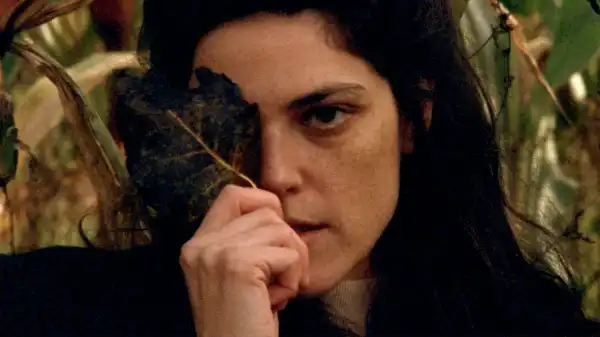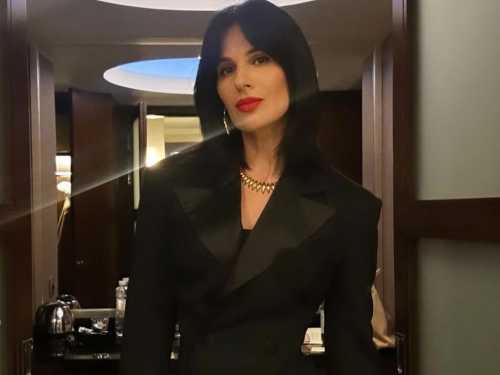
Save this storySave this storySave this storySave this story
Whether a film is a documentary or a fiction, all contemporary cinema can be considered documentary-fiction in some sense, since most viewers are aware that documentaries are carefully crafted to shape a narrative, and that the making of a fiction film is often as compelling a story as the story told in the script. In the new documentary-fiction film Invention, directed by Courtney Stevens and starring Callie Hernandez, who shares a writing credit with Stevens and whose real-life family history serves as the basis for the plot, fiction and documentary elements intersect and intertwine to compelling effect. Yet this unique form is only one feature of the film’s modernity. Invention is nothing less than the latest report on the state of the American mind—the widespread inability to distinguish between fact and fiction.
Callie Hernandez stars as the intriguingly named Carrie Fernandez, who travels to the Berkshires, Massachusetts, to collect the ashes of her late father, John, a doctor who had long practiced alternative medicine. She runs into the professional executor of his estate (James N. Kienitz Wilkins), who informs her that her father left behind many unpaid debts and a tangled legal web (including accounts and business entities under various names), and gave her his patent for an electromagnetic medical device that supposedly brings transformative (though ill-defined) benefits to those who sit in front of it. Then, while exploring the attic of her father's house, she finds the contraption itself—a cylindrical structure of multicolored glass tubes, about the size of a desk lamp, topped with a magnetic coil—and decides to investigate.
Carrie's research takes her into the businesses and homes of various people whose names appear in her father's papers. They include investors like her friend Tony (Tony Thorne), the owner of an antique shop, and Henri (Kaveh Zahedi), a suave wheeler-dealer who tried to connect him with venture capitalists; there's also the owner of a machine shop (Joe Swanberg), who had a contract to make the gadgets. Carrie already knew her father was self-absorbed and irresponsible. Now she realizes that he was considered brilliant—known locally as Dr. J—and also, depending on the interviewee, persuasive, secretive, paranoid, and deceptive. She meets a woman named Babbie (Lucy Kaminsky) who views Dr. J. as a cult leader, swears by his device, and believes, among other things, that England owns the United States, that a “quantum banking system” will vomit money into everyone’s accounts, and that Carrie’s father has been “taken out.” Another acquaintance of Carrie’s father, a watchmaker named Paul (Paul Klayman), who works in Tony’s shop, worries about the world domination of a High Mason, believes that the world’s power centers have obelisks—“the lost penis of Osiris”—in common, and believes that the late Dr. J.’s electromagnetic device is viable. “The body is electric,” he muses. “Even Walt Whitman worried about electricity.” (When Carrie tries the device herself, it gives her acid-tinged psychedelic visions.)
In short, Carrie is quickly diving into deep waters. But those waters were deep before she knew it, as she set foot on her father’s property (the film was shot in Great Barrington, Massachusetts) and immersed herself in its peculiar social scene. Her father’s house, rented with funds from investors, is considered posh by locals, though the neighborhood is filled with, as Tony tells Carrie, “people with deep pockets” and people (including Tony and her father) looking for “reinvention.” Another of Tony’s employees, a failed comedian named Sham (Sam McGlynn), takes her to an Alice in Wonderland-style corn maze (such a place exists). He calls it a place where “hip yoga moms” go; Carrie, despite her dainty posture, is not one. Her father's investor, Henri, lives on a beachfront property where, sitting in a lounge chair overlooking the river and smoking pot with Carrie, he tells her that this is where he often relaxes to read Henry David Thoreau's Walden: “He asks, 'What are you doing here and why?' Your father always asked those questions.”
And maybe he did. But Carrie's father also went on television to promote counterfeit medical devices and dubious supplements, and made videos promoting pseudoscientific theories to sell his wares. Stevens includes many of these clips in the film, letting them play out at mesmerizingly seductive lengths. Note: The doctor in them, John Hernandez (not Fernandez), is the real father of actress Callie Hernandez (not Carrie Fernandez). J
Sourse: newyorker.com






